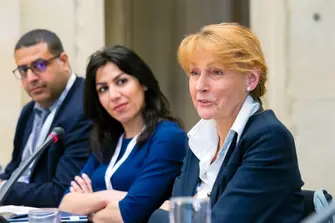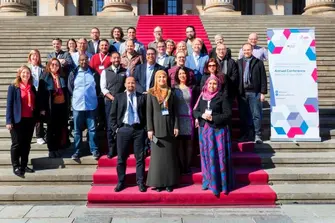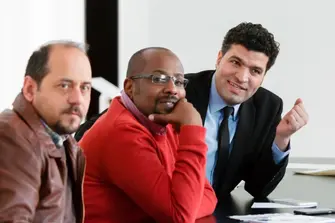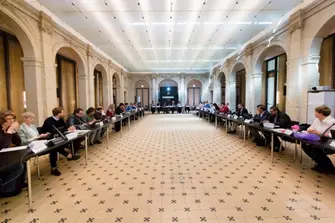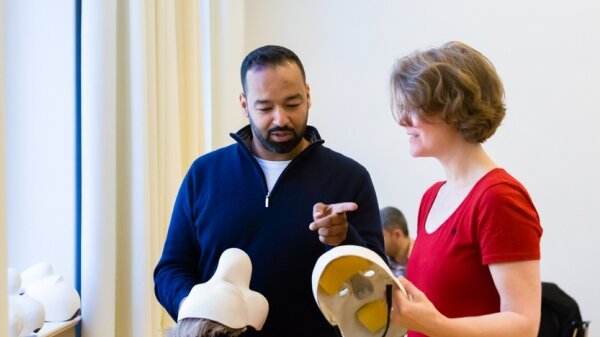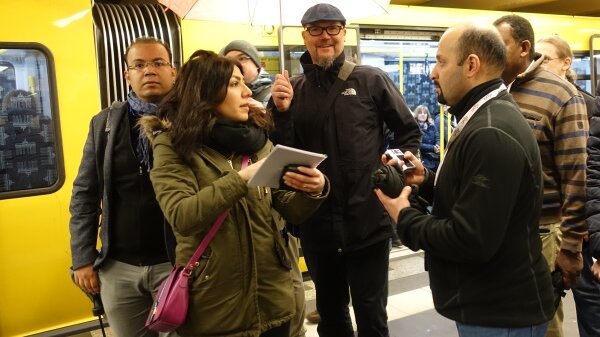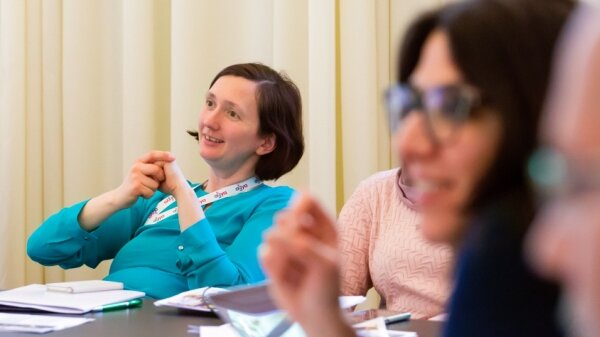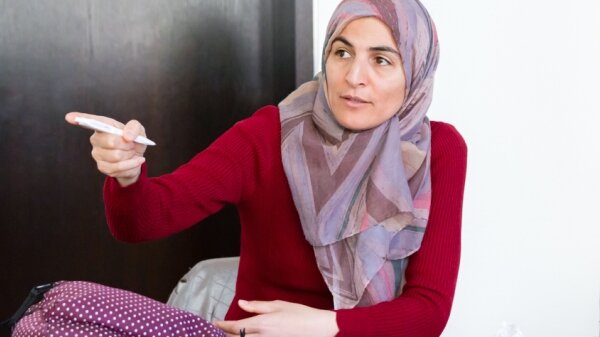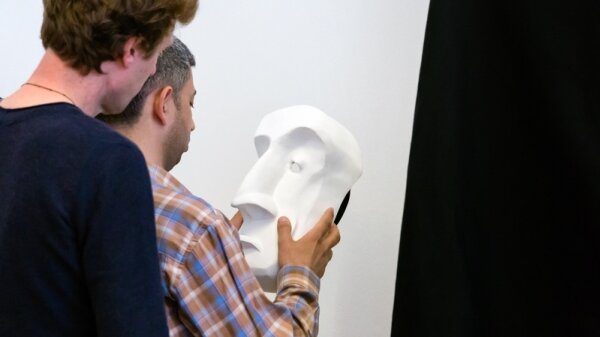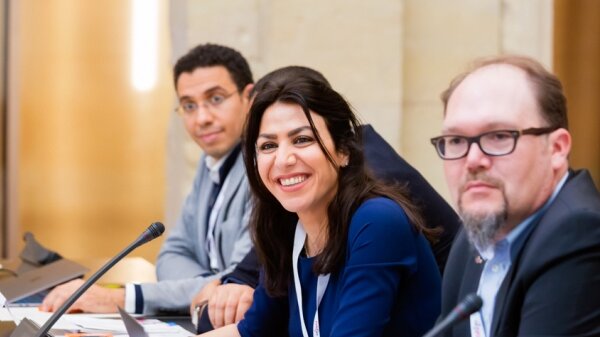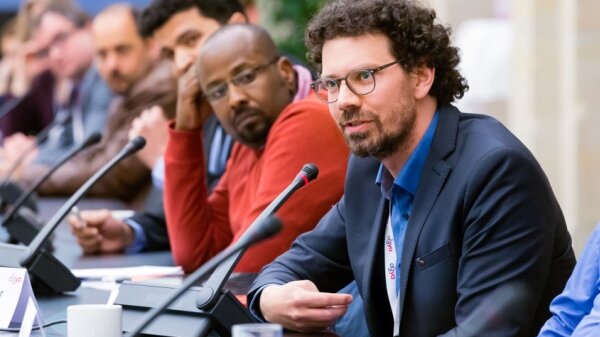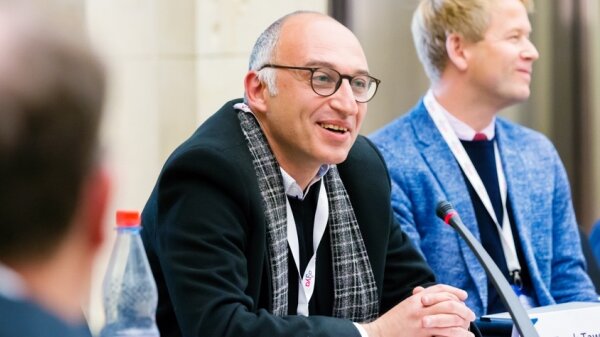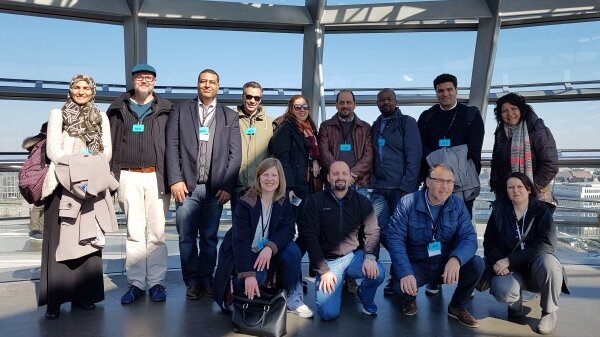AGYA Annual Conference 2019 in Berlin
AGYA Annual Conference 2019 in Berlin
Over the course of AGYA’s four-day Annual Conference 2019 in Berlin, AGYA members and alumni participated in a wide-ranging program comprising a mix of member and public events. They explored historic districts of Germany’s capital city in a teambuilding scavenger hunt, embarked on networking excursions to the German parliament and Adlershof technology hub, participated in expert training sessions to enhance their skills in communicating scientific knowledge to society, met with high-ranking German politicians, took part in a public forum on ‘Data Science and Artificial Intelligence’ and attended an interactive opening event for a joint AGYA and Neues Museum exhibition on shared Arab-German storytelling traditions. The opportunities for teambuilding, networking and training offered at the Annual Conference 2019 in Berlin provided members with alternative formats for peer-to-peer exchange and embody AGYA’s commitment to promoting the full scientific careers of Academy members.
Visiting Germany’s centre of political decision-making and a leading hub of scientific innovation
Taking advantage of the location of this year’s Annual Conference in Berlin, AGYA members visited key sites and networked with top players in scientific policy-making and applied cross-sectoral innovation. They were offered the inside scoop on German and European science policy at a meeting with Edelgard Bulmahn, former Bundestag Vice President and Federal Minister of Education and Research. Bulmahn took the chance to discuss the academy’s current research projects with AGYA members and exchange perspectives on pressing issues of Arab and German science communities. At the invitation of Green Party Parliamentarian Omid Nouripour, AGYA members took a guided tour of the German Bundestag, where they learned about the history of the building and Germany’s system of parliamentary politics. ‘I was really impressed by the political history and how the ideal of transparency is translated into the glass of the building’, said Tunisian AGYA member Dr. Anis Ben Amor, ‘everything is clear and you can see it, nothing is hidden, which is important because politics is meant to serve the public. The transparent design embodies the close proximity of citizens to the political arena, to the locus of political decisions and policy-making.’
From the Bundestag, AGYA members travelled to Adlershof Science City, a leading technology park in Berlin where high-level networking between relevant players in applied economic, science and research sectors mirrors AGYA’s aim to be an incubator for innovative research cooperation across all disciplines. Based at the Adlershof site, German AGYA member Dr. Philipp Blechinger, who heads the Off-Grid Systems Research Unit at the Reiner Lemoine Institute, introduced his AGYA colleagues to his research and highlighted the plethora of opportunities for interdisciplinary and international research collaboration offered by the Adlershof model. Egyptian AGYA member and political sociologist Dr. Nadine Abdalla was impressed by the synergies made possible through the proximity of universities, independent research institutes and industry all in the same location. ‘This model is really interesting for Egypt’, she noted, ‘especially because it’s not just hard sciences, but social sciences and humanities are involved too.’
Building AGYA Members’ Capacity for Communicating Scientific Results to Society
In parallel to the networking excursions, other AGYA members took advantage of two tailor-made training workshops offered in the framework of the Annual Conference 2019 in Berlin. One workshop, facilitated by political scientist Ludwig Schulz, head of the Middle East programme at the Centre for Applied Policy Research at the Ludwig Maximilian University of Munich, focused on policy brief writing. Members learned techniques for translating their research into effective policy papers, from how to identify and frame problems as policy-relevant issues to choosing the most important stakeholder groups to target and strategies for conceptualizing and developing actionable and effective recommendations. AGYA members who participated in the training came away with a better understanding of how scientists and academic experts can play a valuable role in shaping policies to address societal challenges.
The second training focused on communication and body language through theatre practice. Trainers Colette Roy and Hans-Henning Wulf from the Accademia Teatro Dimitri in Switzerland offered AGYA members and alumni the chance to reflect on and improve their ability to proactively communicate the results and relevance of their research for society to diverse audiences by focusing on body language and non-verbal communication skills. The workshop participants explored themes like presence, authenticity, interaction, spontaneity and body language from different perspectives, with the aim of provoking long-term changes in patterns of thinking, sensing, feeling and interacting with others. Exercises with character masks allowed participants to focus on posture and body language, encouraging them to listen to their movements and gain a better sense of what they express through physical as opposed to verbal means. ‘It was great and really unique’, said Kuwaiti AGYA member Dr. Mohammed Alkatan about the training, ‘I learned techniques to convey the energy inside me to others, to connect with them, even when they couldn’t see my facial expressions. It gave me a whole new perspective on communication.’
Uniting AGYA members for teambuilding, mutual exploration and exchange
The AGYA Annual Conference 2019 in Berlin also included a City Rally challenge for members, alumni and staff. Divided into four intercultural teams, participants tested their critical thinking, creativity and communication skills as they deciphered clues, collectively solved tasks and navigated a new city without the help of their smart phones. After two hours of urban exploration and with all their tasks completed, the teams reconvened for a concluding discussion, where they enthusiastically swapped stories of the morning’s challenges and triumphs. With current Academy members spread across research institutions throughout Germany and 16 Arab countries, teambuilding activities at AGYA Annual Conferences provide members with a vital opportunity to interact and get to know each other in settings other than formal academic venues.
AGYA Annual Conferences are key events for maintaining the vibrant spirit of the Academy
Every year, AGYA hosts an Annual Conference in Germany and another in an Arab country, in which members explore relevant sites and academic contacts in the host city through teambuilding activities, training programs, networking excursions and cultural events. Such activities spur peer-to-peer exchange and spark ideas for new collaborative research initiatives, alongside the Annual Conference’s core function as a venue for Working Group meetings and the General Assembly, in which AGYA members autonomously decide on all of the Academy’s activities and internal administration. AGYA’s Annual Conference 2019 in Germany’s political and innovation capital, Berlin, offered members exclusive insight into the core locations, actors and integrated political and economic aspects of applied multi-sector research on some of the most pressing issues facing society today, from climate change to artificial intelligence (AI) and how knowledge can traverse the bounds of space and time through stories. The activities boosted members’ communication skills and connected them to an unparalleled network of outstanding scholars and decision-makers at the forefront of scientific innovation relevant for society.
